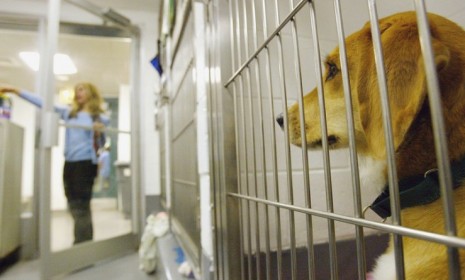Should animal abusers be treated like sex offenders?
Just like child molesters, animal abusers in one New York county will have to register so their neighbors know who they are

A free daily email with the biggest news stories of the day – and the best features from TheWeek.com
You are now subscribed
Your newsletter sign-up was successful
Suffolk County, N.Y., has become the first local government in the nation to launch an animal abuser registry, and New York state itself is considering a bill that would require sheriffs in every county to notify anyone living within a half mile of a convicted animal abuser. Should such a system be implemented nationwide, or have animal-rights activists gone overboard? Here, a brief guide:
How do animal abuse registries work?
They're similar to registries for sex offenders, although not identical. Suffolk County plans to post convicted animal abusers' names, addresses, and photographs online. Pet stores, breeders, and animal shelters will have to check the registry and refuse to let anyone on it buy or adopt a pet. Everyone who has been convicted of a crime such as animal torture or aggravated cruelty to animals will be required to sign up, and their names will remain on the list for five years. The County's definition of "animal abuse" also includes animal fighting, failing to feed pets, abandoning animals, and harming a service animal.
The Week
Escape your echo chamber. Get the facts behind the news, plus analysis from multiple perspectives.

Sign up for The Week's Free Newsletters
From our morning news briefing to a weekly Good News Newsletter, get the best of The Week delivered directly to your inbox.
From our morning news briefing to a weekly Good News Newsletter, get the best of The Week delivered directly to your inbox.
Is this just meant to shame abusers?
That's part of it. Public shame has long helped discourage crime, from days when Puritans used stocks to punish colonial criminals to more recent efforts to combat prostitution by publishing photos of prostitutes' "johns" in newspapers. But beyond the shame factor, the Animal Legal Defense Fund says nationwide registries would stop abusers from sidestepping court orders preventing them from owning an animal by simply moving to another county or state.
Are these registries likely to become common?
Three New York counties have adopted them — Suffolk is just the first to implement one. And New York lawmakers aren't the only ones considering a statewide registry. Similar legislation has been proposed in 25 other states, including New Jersey, Connecticut, California, Texas, Pennsylvania, Florida, and Maryland.
A free daily email with the biggest news stories of the day – and the best features from TheWeek.com
Is this really necessary?
Critics say animal abuse registries will waste the time of local law enforcement officers, time better spent protecting humans from criminals. But supporters say reining in animal abusers also keeps people safe, because studies indicate that people who hurt animals are five times more likely than others to go on to harm humans. "There's a strong correlation between people who abuse animals and [those who] graduate to abusing people," says Michigan state Rep. Harvey Santana (D-Detroit), who has proposed a registry in his state.
Sources: Bloomberg BusinessWeek, Care2, Watertown Daily Times
-
 The environmental cost of GLP-1s
The environmental cost of GLP-1sThe explainer Producing the drugs is a dirty process
-
 Greenland’s capital becomes ground zero for the country’s diplomatic straits
Greenland’s capital becomes ground zero for the country’s diplomatic straitsIN THE SPOTLIGHT A flurry of new consular activity in Nuuk shows how important Greenland has become to Europeans’ anxiety about American imperialism
-
 ‘This is something that happens all too often’
‘This is something that happens all too often’Instant Opinion Opinion, comment and editorials of the day